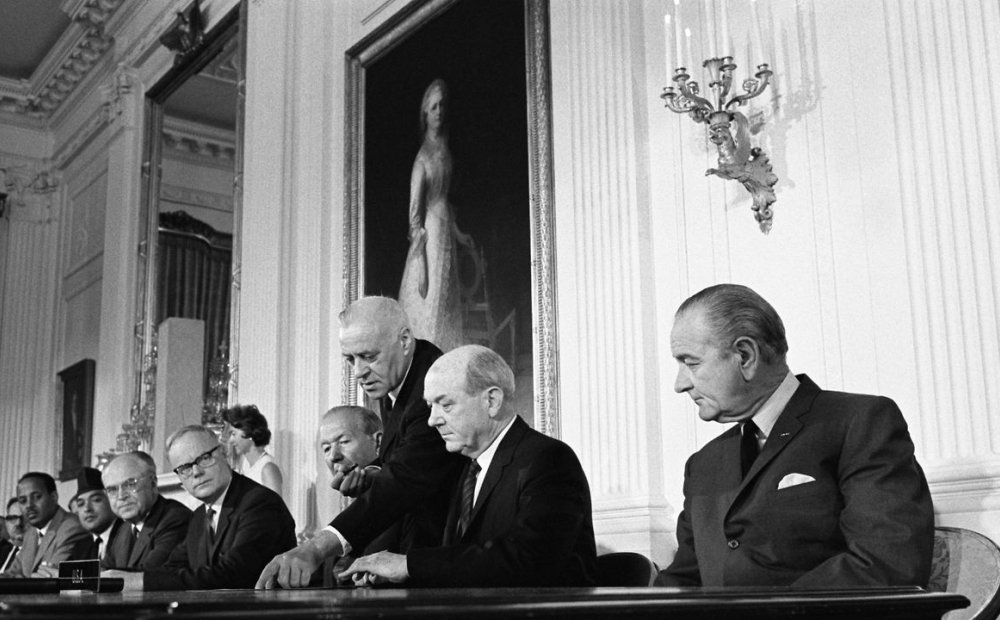OFF SITE EVENT—The Making of a Nuclear Order: Negotiating the Nuclear Non-Proliferation Treaty

The Making of a Nuclear Order:
Negotiating the Nuclear Non-Proliferation Treaty
Switzerland, 1–2 March 2014
A conference convened by the Center for Security Studies (CSS), ETH Zurich in association with the Nuclear Proliferation International History project (NPIHP)
The 1968 Treaty on the Non-Proliferation of Nuclear Weapons (NPT) is widely regarded as the cornerstone of the broader nonproliferation regime aimed at forestalling the further spread of nuclear weapons and related technologies. Though it imposes restrictions on the principle of sovereign equality of states, the NPT has been signed by 189 states and was indefinitely extended in 1995, making it the most successful arms control treaty in history.
While the NPT continues to be central to current global nonproliferation efforts and is routinely cited as a successful compromise (“a grand bargain”) between the competing priorities of nonproliferation, disarmament, and access to peaceful nuclear technologies, the treaty’s underlying mechanisms are less widely discussed. Historical research on the origins of the NPT has mainly focused on the negotiations between the superpowers in the 1960s, the role of nonproliferation in the wider politics of détente, and especially on the central importance of the future nuclear status of the Federal Republic of Germany. As a consequence, there has been very little investigation of the motivations and strategic calculi of the various middle and small powers in joining the treaty despite the accompanying imposition of an unequal status and obligations vis-à-vis the five ‘legitimate’ nuclear weapons states.
Conference Objectives
Historical research can contribute towards clarifying some of these questions. This conference aims at collecting evidence about the hitherto overlooked global dimension of the NPT at the time of its creation. We invite papers on both (1) the multilateral negotiations leading to the treaty’s agreed text and (2) the national perspectives on the nascent nonproliferation agreement. We are particularly interested in papers addressing both the negotiations phase (either on the bilateral level or in the ENDC) and the subsequent ratification process in different states. We are most interested in learning about the motives, intentions, incentives, and disincentives—both internal and external—that shaped the decisions of specific governments to become part of, or to refuse participation in, the new regime. We especially welcome contributions addressing less-researched case studies.
Possible questions to be addressed:
- How did governments perceive the further horizontal proliferation of nuclear weapons both globally and regionally? To what extent was a global agreement seen as a solution to such problems?
- How did different powers assess the early proposals for a global agreement on the non-dissemination of nuclear weapons? What was their reaction to the possibility of being subjected to a “second-rank” status as non-nuclear weapon powers?
- Was the envisaged link between curbing proliferation and nuclear disarmament a central factor for states’ decision to accede to the treaty? How important was the promise of civil nuclear cooperation? Did other factors influence decision-making?
- How did these other powers try to influence the drafting process of the NPT? What was the main criticism of the agreed U.S.-Soviet draft of August 1967? Which changes were demanded? Which were achieved?
- What was the internal assessment of the consequences of signing the NPT? Was membership perceived as being consonant with the ultimate abandonment of nuclear weapons ambitions? What was the role of nuclear latency?
- How did the behavior of other states influence the decision making of governments on whether to sign the NPT and to speed up or slow down ratification?
- After the NPT’s entry into force, how was membership or non-membership evaluated? What gains did states seek through their membership?
We expect paper proposals including a detailed description of the evidence used (archival sources and other documentary records on which the paper would be based). Paper proposals should be submitted as a page-long abstract together with a short CV, and should be sent to the Nuclear Weapons Policy Research Group at the CSS (popp@sipo.gess.ethz.ch) by 15 November 2013. For more information on the CSS or ETH Zurich, visit http://www.css.ethz.ch/index_EN.
Hosted By

Nuclear Proliferation International History Project
The Nuclear Proliferation International History Project is a global network of individuals and institutions engaged in the study of international nuclear history through archival documents, oral history interviews, and other empirical sources. Read more
